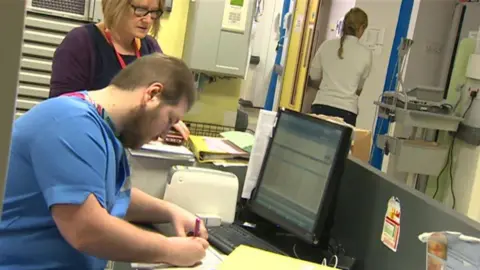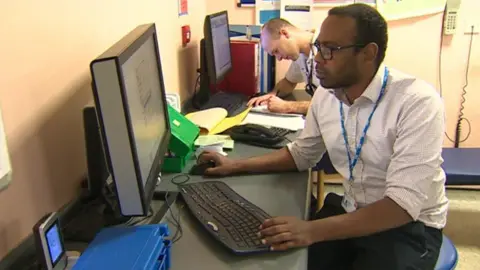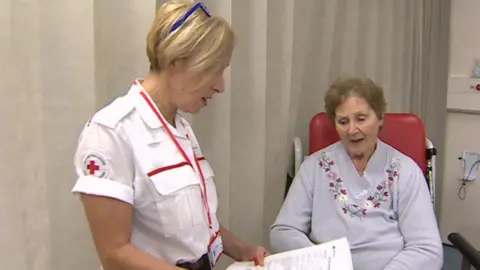A&E target times in Wales worse than last winter
 BBC
BBCPerformance at Welsh A&E departments in December was worse than the same time last year, official figures show.
This is despite Welsh Government assurances that the NHS has been coping better this winter.
NHS Wales bosses conceded that problems at two north Wales hospitals have driven down overall performance, which opposition parties called unacceptable.
Two medical bodies called for social care investment to be speeded up, to keep older patients out of hospital.
In December, 77.8% of patients spent less than four hours in A&E before being admitted, transferred or discharged.
This is compared with 79% in the same month in 2017; the target is 95% should be seen within four hours.
Altogether, A&E units saw 81,823 patients in December, 650 fewer than the same month in 2017, according to latest statistics.
Wrexham Maelor - which had the worst A&E target time in NHS Wales history in August - recorded its second worst performance in December, with barely half of patients seen within the target time.
Glan Clwyd Hospital was again struggling, with only 54.7% seen within four hours.
Meanwhile, 3,900 patients waited more than 12 hours in A&E to be seen; the target is that no-one should wait that long. This is higher than in December 2017. Glan Clwyd and Wrexham Maelor hospitals had the most patients with the longest waits.
Dr Andrew Goodall, NHS Wales chief executive said it was the second busiest December on record for A&E attendances - and remained very busy - but he said the waiting times performance overall had been "skewed" by issues in north Wales.
"People are working very hard and doing the right kind of actions but that performance really does need to improve," he said.

'We've been more prepared'
The University Hospital of Wales in Cardiff saw nearly 11,500 patients through A&E, more than last year. About 83% were seen within the four-hour target time.
Dr Katja Empson, consultant in emergency medicine, said: "Last year, we had a very crowded department which was unsafe and very difficult to manage - this year, so far, the flu hasn't been so severe, we haven't yet seen significant numbers with severe respiratory illness," she said.
"As a department and as a health board we've been more prepared and we've been able to ensure the department has been safer."
Emergency teams are now meeting every two hours in "safety huddles" to spot the pressures and where the delays might be. It has improved communication.

Red Cross has shared the burden
More Red Cross teams are working in A&E to help elderly patients get home quicker.
The charity in the first winter month helped 8,961 patients across seven NHS Wales hospitals.
"We have Red Cross vehicles so we're able to take patients home and that frees up the use of ambulances and we try to put things in place so they don't end up back in hospital," said Nina Langrish, a British Red Cross support worker in Cardiff.
So far, 153 patients have been offered extra help in their homes.
Patient Yvonne Coward, who has breathing issues, said: "I didn't know that they were out there and they're there for you - they're marvellous people.
"It lasts for eight weeks and they'll be calling to see I'm all right at certain times of the day - I think it's wonderful."

In other measures:
- Ambulance performance was better on life-threatening calls, with 72.8% of emergency responses to "red" calls arriving within eight minutes, above the target of 65%.
- For the year to November 2018, 86% of patients newly diagnosed with cancer via the urgent cancer route started treatment within the target.
- By the end of November, 87.8% of patients waiting to start hospital treatment had been waiting less than six months, lower than the target of 95%, while 3.1% had been waiting more than 36 weeks after being referred by their GP.
- Numbers waiting more than 14 weeks for therapy fell from 465 in October 2018 to 380 in November.
Plaid Cymru health spokeswoman Helen Mary Jones said staff were "working their socks off" but there needed to be a proper look at the whole system, including the GP out of hours service and social care - which were leading to patients ending up in A&E.
This was echoed by the Royal College of Emergency Medicine Wales (RCEM) and the Royal College of Physicians (RCP), who issued a joint statement calling on the Welsh Government to speed up plans to invest in social and community care.
"While I welcome the health minister's plans to explore a social care levy, as well as his promise to invest £180m in integrated health and social care services in Wales, I'm concerned that we're not moving quickly enough," said Dr Gareth Llewelyn, RCP vice president for Wales.
"Insufficient social care resources impact on the entire hospital system and contribute to emergency department crowding, 'exit block' and delayed transfers of care."
Conservative health spokeswoman Angela Burns said the figures were unacceptable.
"Sadly, the truth is that this is the new normal for our health service despite the commitment of frontline staff," she said.
